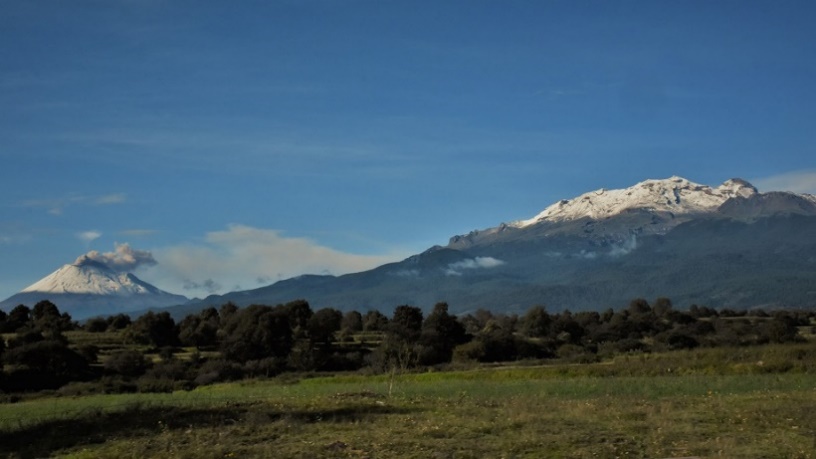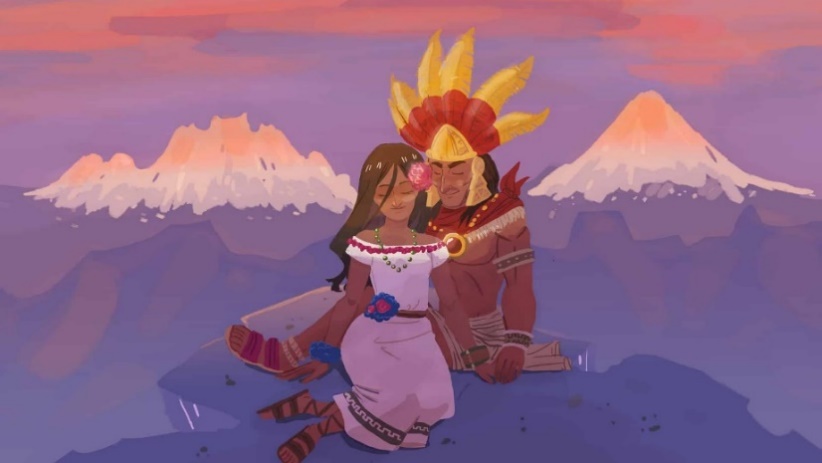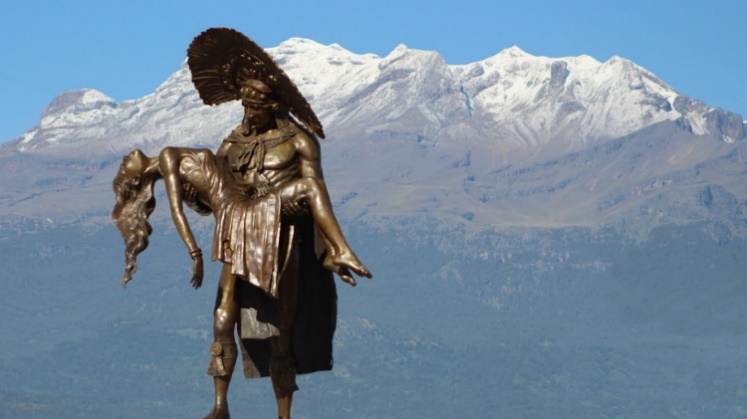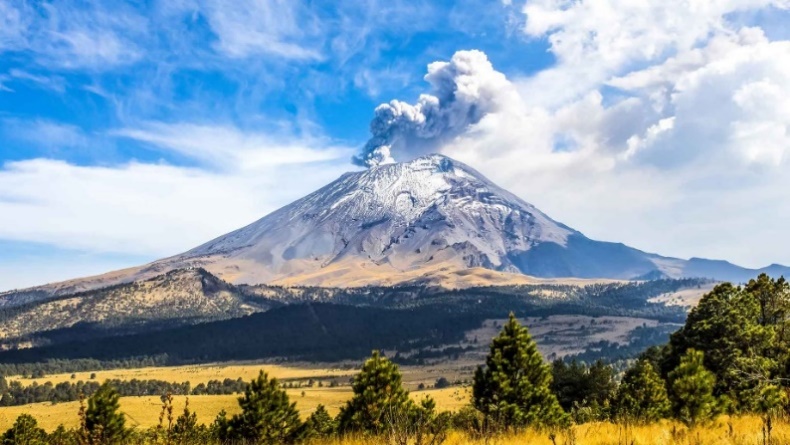Stoy Time
Stoy Time
Aprendizaje esperado: interpreta el contenido de un cuento.
Énfasis: comparte apreciaciones de distintos cuentos sobre expresiones culturales.
¿Qué vamos a aprender?
Are you ready for your English class?
¿Están listos para su clase de inglés?
No olvides tener su cuaderno, así como lápices de colores.
para que apunten o dibujen lo que más les llame la atención y así puedan revisarlo en cualquier momento.
Recuerda también que esta clase estará disponible para que la vean las veces que quieran o necesiten.
Kids, do you like reading?
Niñas y niños, ¿les gusta leer?
¡Qué bueno, a mí también me gusta mucho!
Reading is awesome.
Leer es increíble.
Are you ready to read in English?
¿Están listos para leer en inglés?
Today, I will share a legend about some volcanoes.
En esta sesión compartiré la leyenda de unos volcanes.
Do you know it? ¿La conoces?

Me encanta esa leyenda, recuerdo haberla escuchado en la escuela.
Let´s start.
Empecemos.
¿Qué hacemos?
Once upon a time, there was a beautiful princess named Itza.
Había una vez una hermosa princesa llamada Itza.
She was an emperor´s daughter.
Era hija de un emperador.
Warriors travelled from different lands to meet her.
Los Guerreros viajaban de diferentes lugares para conocerla.
They used to bring presents to her.
Solían llevarle regalos.
She was not interested in any of them.
Ella no estaba interesada en ninguno de ellos.
One day, a warrior named Popoca came to see her.

Un día un guerrero llamado Popoca fue a verla.
And said Princess I don’t have expensive gifts to offer.
Y le dijo Princesa no tengo regalos caros que ofrecerte.
But if you marry me, I promise that I will love you as long as Tonatiuh rises and I will stay by your side forever.
Pero si te casas conmigo, te prometo amarte cada vez que el sol (Tonatiuh) salga y permanecer a tu lado por siempre.

As the time passed, Itza fell in love with him.
Al pasar el tiempo, la princesa se enamoró de él.
The Emperor wanted Itza to marry a wealthy and powerful person.
El emperador quería que Itza se casara con un hombre poderoso y rico.
But he also knew that Popoca was the best and bravest warrior in his kingdom.
Pero también sabía que Popoca era el mejor y más valiente guerrero en el reino.
The Emperor had been in a war for years with a neighbor town.
El emperador había tenido guerra por muchos años con un pueblo vecino.
The leader was called Jaguar.
El líder era llamado Jaguar.
So, the emperor talked to Popoca and told him If you defeat Jaguar, I will let you marry my daughter Itza.
Por tanto, el emperador le dijo a Popoca “si vences a Jaguar, te permitiré casarte con mi hija, Itza.
¡Qué difícil decisión!
Veamos unos enunciados que nos ayudará a imaginar la siguiente parte de la leyenda
* fight against Jaguar. Pelear con Jaguar.
*they would soon defeat Jaguar. Ellos muy pronto vencerán a Jaguar.
*to offer her a potion. Para ofrecerle una poción.
*Itza heard the news. Itza escuchó la noticia.
* drink this tea princess. Bebe este té princesa.
Let’s continue the story.
Vamos a continuar con.

Popoca gathered his men and marched to fight against Jaguar.
Popoca reunió a sus hombres y se marcharon para luchar contra Jaguar.
They fought many times, losing some battles.
Ellos pelearon muchas veces, perdiendo algunas batallas.
But when the end seemed near, they began winning them.
Pero cuando el final se acercaba, ellos empezaron a ganar.
It was clear that they would soon defeat Jaguar and his men.
Estaba claro que pronto Popoca y sus hombres los vencerían.

Realizing this, Jaguar had a plan, he sent a Popoca´s messenger to tell Itza that Popoca was dead and told him to offer her a potion to make her sleep.
Jaguar, al darse cuenta de que sería vencido, se le ocurrió un plan, envió un mensajero de Popoca a decirle a Itza, que Popoca había muerto y le sugirió que le ofreciera una poción para que se durmiera.
As soon as Itza heard the news, she cried No that cannot be possible.
Al escuchar la noticia Itza gritó: Eso no puede ser posible.
I know how you feel princess, said the messenger.
Sé cómo te sientes princesa, dijo el mensajero
But drink this tea princess. It will help you to feel better.
Pero toma este té princesa, te ayudará a sentirte mejor.
Itza drank the potion and soon, she fell into a deep sleep.
Itza tomó la poción y cayó en un profundo sueño.
Well done kids. Bien hecho niñas y niños.
Next day, Popoca defeated Jaguar and marched back to the palace.
Al siguiente día cuando Popoca venció a Jaguar, regresó al palacio.
He felt so happy to share the good news with the princess and the emperor.
Iba muy feliz de compartirle la buena noticia al emperador y a la princesa

But when they arrived the emperor said:
Pero al llegar el emperador le dijo:
One of your messengers told us that you were dead! Itza was heartbroken. She drank something strange and now we cannot wake her up.
Un mensajero nos dijo que habías muerto, a la princesa se le rompió el corazón y tomó algo extraño, ahora no la podemos despertar.
This can’t be true! said Popoca.
Esto no puede ser, dijo Popoca.
He ran to her bedroom and held her in his arms.
Corrió a su habitación y la tomó en sus brazos.
He called her name, over and over. But Itza did not wake up.
Él le habló y le habló, pero la princesa no despertó.
Cool air will surely revive her. Popoca told the emperor.
El aire fresco la revivirá, le dijo Popoca al emperador.

He carried Itza outside and laid her on a flower bed.
Él la cargo y la llevó al monte, acostándola en una cama de flores.
He knelt down beside her. Popoca refused to move.
Popoca se hincó al lado de ella y se reusó a moverse de ahí.
He stayed next to Itza, just as he had promised as long as Tonatiuh rises.
Permaneció a su lado como lo prometió, cada vez que Tonatiuh salga. Tonatiuh significa sol en náhuatl
As time passed, the snow covered their bodies.
Al pasar el tiempo sus cuerpos fueron cubiertos por la nieve.
Now they are two of the highest volcanoes.
Ahora son dos de los más altos volcanes.

One is known as Iztaccíhuatl or sleeping woman.
Uno es conocido como el Iztaccihuatl o la mujer dormida.
The other is known as Popocatépetl.
El otro es llamado Popocatépetl.

The End
Fin.
Do you think this is an interesting legend?
Consideran, ¿Qué es una leyenda interesante?
Por supuesto habla de los volcanes de nuestro México querido, pero ¿Dónde están situados?
Limitan con el Estado de México, Morelos y Puebla.
¿Lograste encontrar o imaginar cómo terminaron los relatos de hace dos semanas?
Uno de los relatos era la sopa de piedra.
Recuerda que aquí leímos que eran dos viajeros que llegaron a un poblado y nadie les quería compartir alimento y decidieron preparar una comida mágica, y ¿Qué crees que descubrí?
What?
¿Qué?
Que además de la piedra – Stone que le agregaron a la sopa, también le pusieron algunas de las verduras que vimos.
Like what?
¿Cómo cuáles?
Potatoes,
papas,
tomatoes,
jitomates,
carrots,
zanahorias and celery y apio.
Finalmente, el pueblo pasó un gran momento con los viajeros.
And guess what?
¿Qué crees?
This story appears in cultures around the world.
Este cuento aparece en culturas alrededor del mundo.
For example, it is said that here in Mexico, there´s a version in the time of the Mexican Revolution.
Por ejemplo, se dice que aquí en México, hay una versión que se sitúa en los tiempos de la Revolución Mexicana 1019-1920, cuando los soldados llegaban a San Miguel Allende, Guanajuato, el alcalde ordenaba que no se compartieran los alimentos debido al contexto de pobreza que se vivía. Por tanto, los soldados los invitaban a hacer una sopa de cactus o con las espinas de este mismo.
And, what about the story Why the Cricket chirps?
¿Por qué el grillo canta? Did you have the opportunity to finish reading it or imagine the end? ¿Tuvieron oportunidad de terminar de leer el final del cuento o imaginarlo?
I will share the end.
No se preocupen se los comparto.
Did you remember that once he arrived North, the moose and the owl warned him to look for a shelter to keep from the cold?
¿Recuerdan que cuando el grillo llegó al norte, el alce y el búho le advirtieron refugiarse del frio?
Sí, pero el grillo no les hizo caso.
That’s right!
¡Es correcto!
The cricket did not listen, because crickets do whatever they want.
El grillo no hizo caso, porque los grillos hacen lo que quieren.
¿Y qué pasó con el grillo?
Let´s read the end.
Next morning, the cricket was ready to go home and tell the ant about his trip.
A la mañana siguiente, el grillo estaba listo para irse a casa y contarle su viaje a la hormiga.
But he hopped to start flying, and he couldn’t. Pero el grillo empezó a saltar e intentó volar, y no pudo.
his wings had been frozen.
sus alas se habían congelado.
So, the cricket had to hop all the way home. It took him days to return.
Por tanto, tuvo que regresar a casa saltando, eso le llevó días para llegar.
¡Claro! Estaba muy lejos.
When he arrived home, he found out that when he rubbed wings together, they made a chirping noise.
Cuando llegó a casa descubrió que, al frotar sus alas, emitían un sonido que trinaba.
But he couldn´t fly anymore, just he could hop and rub its wings.
Él ya no pudo volar jamás, solo saltar y frotar sus alas.
It is the sound that he makes when we say he´s singing.
Ese es el sonido que emite cuando decimos que el grillo está cantando.
The End.
El reto de hoy:
I invite you to read your favorite stories in English.
Los invito a leer sus cuentos favoritos en inglés.
Little by little you will get it.
Poco a poco lo lograrán.
Recuerda que los puedes leer tantas veces como quieras, busca estos u otros cuentos en tus libros de texto o en internet con el apoyo de un adulto.
Remember Reading is awesome.
Si te es posible consulta otros libros y comenta el tema de hoy con tu familia.
Si tienes dudas o necesitas ayuda para realizar las actividades propuestas o alguna sugerencia y quieren compartirlas con nosotros pueden enviarlas al correo aprende_en_casa@nube.sep.gob.mx
¡Buen trabajo!
Gracias por tu esfuerzo.